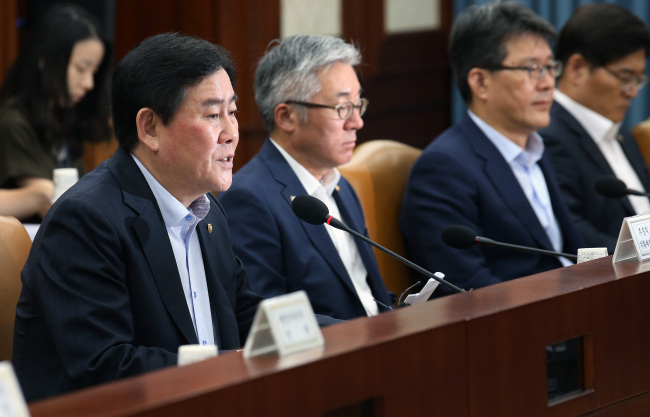Korea to reduce consumption taxes to boost economy
By Korea HeraldPublished : Aug. 26, 2015 - 18:41

The government will lower consumption taxes in its desperate effort to stimulate the sagging economy, officials said Wednesday.
The decision was announced after a meeting of economic-related ministers to discuss measures to boost consumer spending.
Finance Ministry officials said the government would temporarily cut consumption taxes on cars and large electronics goods, hoping that the measures would help revitalize economic growth.
Private consumption has remained in the doldrums since the Middle East respiratory syndrome outbreak in late May. In June, retail sales and the service sector contracted at the sharpest pace since February 2011, with consumption backtracking 0.3 percent from three months earlier.
“Private spending showed signs of improving in July, but the momentum remains weak,” Deputy Finance Minister Jeong Un-bo said after the meeting. “Unless things turn around quickly, weak consumption could become a trend.
“The goal of the latest plan is to stimulate pent-up demand in consumers who have benefited from a steady rise in gross domestic income that rose 6.7 percent on-year in the April-June period.”
Under the plan, excise taxes levied on cars, large household appliances and certain health food supplements like royal jelly can be slashed by 30 percent until Dec. 31.
Excise tax rates on all cars and large air conditioners, TVs, washing machines and refrigerators will lower to 3.5 percent from 5 percent.
The move could lower tax revenue, but the Finance Ministry said the drop would be offset to some extent by more sales that can allow other dues to be collected.
Car- and home appliance-makers welcomed the consumption tax cut, saying the measure would help boost their sales in the second half of the year.
Finance Ministry officials forecast that these measures will help boost domestic spending to increase the gross national product by 0.1 percent in the fourth quarter.
The Finance Ministry also said the taxable price for furniture, cameras, watches, bags, fur, carpets and jewelry will be adjusted to a base of 5 million won from the current 2 million won, which can make these products cheaper.
In addition, the government said it will encourage large retailers, online shopping malls and supermarkets to launch large-scale discount sales in October. This move will be timed to take place with discount promotions offered by the country’s tourism sector.
Finance Minister Choi Kyung-hwan said at the meeting that the plan calls for a Korean version of “Black Friday” sales to be held across the country for about two weeks to spur spending.
“This event will be joint promotional campaign by large retailers,” he said.
On increasing domestic tourism, the policymaker said the government wants to organize an autumn tourism week running from mid-October through Nov. 1, with the public sector taking the lead in encouraging its employees to go on vacation during this period. This can allow more money to reach the market, and spur the domestic retail and tourism sectors that were hit the hardest by MERS.
The government, meanwhile, said it would lift all restrictions on the so-called housing pension program that can allow senior citizens to spend more.
This will allow more senior citizens to receive monthly pension payments from banks by using their homes as collateral. In the past, only homes valued at under 900 million won were eligible.
The ministry predicted that the consumption-boosting measures would raise the country’s economic growth rate by 0.025 percentage point.
South Korea is trying to achieve at least 3 percent growth, although many independent think tanks said mid- to high 2 percent growth is more realistic for 2015.
From news reports
-
Articles by Korea Herald











![[Hello India] Hyundai Motor vows to boost 'clean mobility' in India](http://res.heraldm.com/phpwas/restmb_idxmake.php?idx=644&simg=/content/image/2024/04/25/20240425050672_0.jpg&u=)








